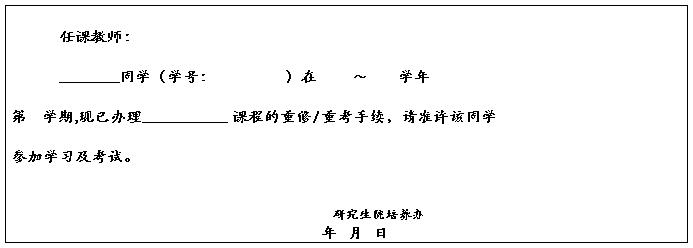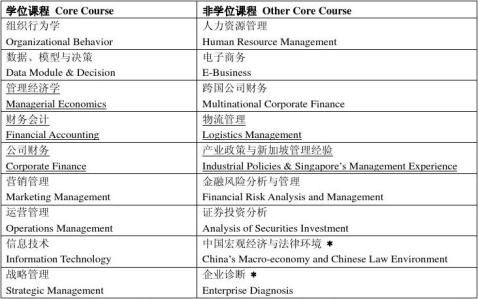上海交通大学研究生课程重修、重考申请表
~ 学年第 学期


第二篇:上海交通大学新加坡研究生院
上海交通大学新加坡研究生院
2010 MBA 招 生 简 章
上海交通大学是中国教育部直属、由中国教育部和上海市共建的全国重点大学。上海交大安泰经济与管理学院MBA项目致力于培养具有全球视野、完整知识结构和持续创新能力的事业经理人,坚持“以规范保质量,以质量创品牌,以品牌求发展”的办学宗旨,依据国际标准建立了一套严格规范的管理制度和管理程序,并获得了国际权威的AMBA认证和EQUIS认证。全球著名财经媒体英国《金融时报》20xx年度MBA全球百强排行榜,上海交通大学安泰经济与管理学院MBA项目首次参评便取得佳绩,列为全球第41位。
20xx年10月上海交通大学新加坡研究生院在南洋理工大学成立,这是中国第一个海外研究生院,也是新加坡 “世界级大学引进新加坡计划”下的第九所世界名校。上海交通大学新加坡研究生院开设的工商管理硕士(MBA)教育项目,是由上海交通大学安泰经济与管理学院和南洋理工大学商学院合作,在新加坡招生,授予上海交通大学工商管理硕士(MBA)学位的国际合作办学项目,专为在新加坡任职的具有工作经验的企业管理人员设计,旨在培养具有全球视野和国际竞争力的管理精英, 为期望进军中国的人士提供了一条了解中国、掌握中国市场规律、驾驭中国市场的捷径。学员通过MBA阶段的学习,逐渐成为精通华文、熟悉中国国情及投资环境、深谙现代管理和工商运作模式的商界人才。
一、报考条件
具有大学本科学历,自毕业后3年或3年以上工作经验;具有大学专科学历,自毕业后5年或5
年以上工作经验;具有研究生毕业学历,自毕业后2年或2年以上工作经验。
二、考试及入学时间

三、考试方式及录取
入学考试:采用笔试(共计两门)和面试相结合的方式,由上海交通大学自主命题。
笔试科目:1、英语(满分:100分); 2、综合考试(满分:200分):含数学、语文与逻辑 面 试:由面试小组专家对考生进行个别面谈(满分:100分)。
录 取: 根据考生笔试和面试的总成绩(面试成绩低于60分不予录取),并结合考生对正式
报名表中所列问题和论文的书面回答情况,以及考生的学习能力、职业成就、领导技巧和个人潜质等综合因素,择优录取。
四、授课师资及教学方式
遴选两院的资深教授、知名学者联袂授课。教师不仅学术造诣深厚,而且具有丰富的企业管理人员培训和管理咨询经验,采用课堂讲授、案例研讨、管理实战、情境模拟、项目作业等多种教学方式,突出案例教学。
1

五、课程设置
课程分学位课程和非学位课程,总学分为45学分。课程设置整合了上海交通大学和南洋理工大学的优势课程,涵盖工商管理的各个方面,尤其强调理论联系实际和面向国际竞争环境。其中2/3课程由上海交通大学安泰经济与管理学院的教授授课,1/3课程由南洋理工大学南洋商学院的教授授课。
上海交通大学新加坡MBA项目课程设置

课程内容简介 Course Description 备注:标注下划线的5门课程由新加坡南洋理工大学的教授授课。 * 为暂定课程
学位课程 Core Course
组织行为学 Organization Behavior ( SJTU ) (2 学分)
本课程介绍了组织中管理人员角色职责的基本理论以及组织中行为的本质、形式和范围的相关理论和实践。
This course aims to introduce and assess basic theories of managers’ roles and responsibilities, and to acquaint students with the nature, forms and scope of behavior within organizations.
数据、模型与决策 Data Module & Decision ( SJTU ) (3 学分)
本课程以管理统计学和管理运筹学为基础,内容包括统计数据收集、描述统计、推断统计、相关与回归分析、预测分析、决策分析、数学规划、实用优化方法等,使学员了解和掌握社会经济管理问题的定量分析与决策的方法、技术和实用软件系统。
This course provides an introduction to statistics and probability as techniques for collecting, summarizing and interpreting data and for coping with uncertainty in the management decision-making process.
管理经济学 Managerial Economics ( NTU ) (3 学分)
本课程介绍了微观经济学的基本理论,以及这些理论与方法在企业、公共和非盈利机构的管理决策中的应用。这些理论包括需求供给理论、生产成本理论、市场效率分析、定价策略、投资和生产决策、博弈论与厂商策略、不确定性和不对称信息等。
2
The course introduces key concepts of microeconomics, and its application of managerial decision-making in enterprises, public and non-profit institutes. These theories include demand-supply theory, production-cost theory, and analysis of market efficiency, pricing strategies, investment and production decisions, game theory and the strategic interactions of firms, uncertainty and asymmetric information.
财务会计 Financial Accounting ( NTU ) (3 学分)
本课程介绍了财务报表的主要概念,标准和实务,提高学生结合其它信息使用会计的技能,更好地为商业决策服务。
The course introduces key concepts, standards and practices of financial reporting and develops skills for using accounting with other information to serve the needs of business decision-making.
公司财务 Corporate Finance ( NTU ) (3 学分)
本课程讲述公司一系列的财务决策,涉及财务管理的基本理论、基本原理、基本技术和基本方法。通过学习,将了解财务管理的最终目的是实现公司价值的最大化,而公司价值的大小主要取决于未来现金流量的多少,取决于获取未来现金流量的时间,取决于未来现金流量的风险。
This course is about financial decisions by corporations. The scope of the course will cover the fundamental financial management theories, principles, techniques and methods. The emphasis of learning the course is to understand that the financial management primary objective is to maximize the value of the firm, and the fundamental determinants of the value of the firm are the magnitude of future cash flows, their timing, and their friskiness.
营销管理 Marketing Management ( SJTU ) (3 学分)
本课程研究了一些影响市场营销决策的基本因素,例如买方行为、竞争、定价、广告、分销和销售方式等。
The course examines the fundamental issues that influence marketing decisions, such as buyer behavior, competition, pricing, advertising, distribution and selling methods.
运营管理 Operation Management ( SJTU ) (3 学分)
本课程研究了有关商品和服务管理方面的一些基本原理和实用的工具,重点放在有效地配置资本、材料、信息、技术和人力资源。目的是为产品和过程的开发、质量管理、存货规划、供应链管理、技术等提供一体化的管理方法。
The course examines some of the basic principles managing the production of goods or services and studies some useful tools. It focuses on the efficient and effective deployment of capital, material, information, technology and human resources. It aims to provide an integrative approach on functional areas such as product and process development, quality management, capacity and inventory planning, supply chain management, technology and managing change.
信息技术 Information Technology ( SJTU ) (2 学分)
本课程重点介绍如何管理信息资源和信息技术。学生在学习过程中将接触到各种信息技术。检测学生的应用能力和对与信息技术相关的竞争优势以及组织上的和管理上的问题的把握。
This course focuses on how to manage information resources and technology. Students will gain exposure to various information technologies, examine their applications; explore the competitive advantages associated with the information technology, and address organizational and managerial implications.
战略管理 Strategic Management ( SJTU ) (3 学分)
通过该课程,学生可以了解到高层管理者如何为企业制定战略,包括目标的确定、产品市场的选择、组织特色的形成、资源的分配、股东利益冲突的解决等。重点了解作为总经理应承担的工作,包括明确组织目标、制定和实施组织战略、激励和管理战略变化。
Students will learn about top management’s job of formulating strategy for the enterprise including the shaping of mission objective, product-market choice and organizational character as well as the allocation of resources to achieve organizational circumstances and conflicting stakeholder interest. Particular attention is placed to the role of the general manager in articulating organizational objectives, formulating and implementing organizational strategies, motivating and managing strategic changes.
3
非学位课程 Compulsory course
人力资源管理 Human Resource Management ( SJTU ) (2 学分)
本课程使学员掌握人力资源管理的基本原理,了解当前人力资源的热点问题,理解人力资源管理基本职能,学会工作分析、制定人力资源规划、招聘、培训、绩效考评、薪酬设计等理论与方法;熟悉团队建设、跨文化管理等现代人力资源开发与管理的新课题。
In this course, students will master the basic principle of human resource (HR), get to know the hot topic of its present development, comprehend its basic function, grasp the theory and method of job analysis, the human resource planning, employee recruitment, cultivation, performance appraisal of stuff, salary design, etc, be familiar with the establishment of teamwork, trans-cultural management and other present exploration and development of modern human resource.
电子商务 E-business ( SJTU ) (2 学分)
这课程旨在帮助学生对网络和电子商务有一个清晰的理解。重点在不同电子商务战略模型的应用,探讨和适应新出现的电子商务技术,在数字经济环境中发展项目执行和策划专门技术。
This course aims to assist students in gaining a clear understanding of Internet and e-business. Attention is placed to apply various e-business strategy models, to explore and adopt emerging e-business technologies, and to develop project execution and planning expertise in a digital economic environment.
物流管理 Logistics Management ( NTU ) (2学分)
本课程主要介绍了现代运营管理的操作与战略,课题主要分析了运营战略和兼并,库存规划和管理,仓库设计与优化和在新经济环境中,运营管理在市场中充当着重要的角色。本课程将以系统的方法介绍现代运营管理的基本思想,原理,技术和方法,并结合案例讨论和实践,达到理论与实践相互应。 This course covers both strategic and operational issues in supply chain and logistics management. It addresses the changing and increasingly important role of logistics in business; supply chain strategy and integration; inventory planning and management; distribution requirement planning. It introduces key concepts, best practices, innovative ideas, practical principles, and critical thinking of integrative supply chain and logistics management.
跨国公司财务 Multinational Corporate Finance ( SJTU ) (2 学分)
本课程讲述跨国公司一系列的财务决策,涉及跨国财务管理的基本理论、基本原理、基本技术和基本方法,包括对未来即期汇率的预测、外汇套利、外汇风险管理、跨国投资分析、跨国融资、国际流动资金管理、国际税收管理和跨国公司重组等。
This course is about financial decisions by multinational corporations. The scope of this course will cover the fundamental multinational financial management theories, principles, techniques and methods including forecasting exchange rates, speculation and arbitrage, foreign exchange risk management, foreign investment analysis, financing foreign operations, multinational working capital management, international tax management, multinational restructuring, and so on.
产业政策与新加坡的管理经验 (2 学分)
Industrial Policies & Singapore’s Management Experiences (NTU)
主旨是协助高级主管了解主要公共政策对国家和国际工业表现的影响。其他有关新加坡的管理经验,包括政府相关企业、外来投资、产业转型、生产力运动和国际竞争力等课题。
The objective of this course is to provide future general managers with an understanding of major public policy influences on industrial performance at the national and international levels. Additional topics in Singapore’s management experiences, such as government-link companies, foreign direct investment, industrial transformation, productivity movement, and international competitiveness will be covered.
证券投资分析 Analysis of Securities Investment ( SJTU ) (2 学分)
本课程着重理论与实践的结合,以现代投资理论为基础,系统介绍现代资产组合等理论,并以此为指导全面介绍金融市场、金融产品及证券投资的分析方法,结合实证案例,旨在让学生对证券市场及产品的分析有一定扎实的理论基础及实践知识。
This course will systematically introduce the history, present situation and possible future trends of Chinese security market in the form of symposiums. It aims that through learning, students can comprehend problems and opportunities on the market, master fundamental methods of analyzing the investment value of the market as well as listed companies, and form effective investment notions and styles. Therefore, the 4
students are able to grasp favorable opportunities for company development or achieve great success of personal investment in the coming tide on Chinese security market.
中国宏观经济分析 China Macroeconomics Analysis ( SJTU ) (2 学分)
本课程帮助MBA学生了解和掌握宏观经济运行的基本原理,中国宏观经济运行的特殊情况,存在的问题和解决问题的思考。促使他们依托宏观经济运行的思考框架,更好地做出他们企业运行的微观决策。 This course helps MBA students understand and master the main principle of macro-economy run, the special run of China’s macro-economy, its problem and the idea of how to settle these problems. It is to spur the students relying on pondering frame of macro-economy run to make better micro decision of their enterprises.
中国法律环境与制度 Chinese Law Environment and System ( SJTU ) (2 学分)
本课程系统研究中国现行法律环境与政策,为外国商人到中国寻找商业机会扫清法律上的障碍。主要内容有:中国法律体系的演变;中国法院体系与司法审判制度;中国的民商法制度;中国的对外贸易政策与法律实务;中国的涉外税收制度;中国加入WTO的承诺及其对中国经济的影响等。本课程的教学方法,以实例研讨为主,注重培养学生实际操作的能力。
This course researches Chinese present law environment and policy. It mainly includes: the evolvement of Chinese law system; Chinese court and justice system; Chinese commercial law system; Chinese foreign trade policy and law practice; Chinese commitment about entry WTO and its effect on Chinese economy, etc. This course focuses on cultivate the students’ practice ability by discussing cases.
金融风险分析与管理 Financial Risk Analysis and Management ( SJTU ) (2 学分)
通过对本课程的学习,要求学生了解金融风险管理的内容、特点、构成与作用;了解国内外金融风险管理的方法和手段,了解风险预算管理;掌握金融风险的分类及其各类金融风险的度量方法的特点和局限性,主要有标准差法,VaR法,期权费用法,KMV方法,风险矩阵法等;能够正确认识和分析金融风险在市场中的危害和作用,能够综合地运用远期、期货、期权和互换等金融衍生产品解决现实的风险管理问题。
课程的主要内容包括:(1)金融风险管理的概念与种类,金融风险管理的识别、度量与控制;(2)以VaR方法、CVaR方法、KMV方法和期权费用法为主要内容的各类金融风险的度量方法;(3)信用风险的度量与管理方法;(4)风险预算管理的产生与发展,风险预算管理的特征、流程与应用;(5)市场风险、流动性风险、操作风险和事件风险的管理方法与案例分析。
Through the study to this course, the students are required to understand the content, feature, constitution and function of Financial Risk Management, to understand the methods and means of Financial Risk Management at home and abroad, to understand risk budget management. Students also need to master the classification of financial risk. There are many methods to measure financial risk such as Standard Deviation, VaR, Option Cost, KMV, Risk Matrix and so on, so it is necessary to master the features and limitations of all these methods. In addition, students are also expected to realize and analyze the danger and function of financial risk in the market correctly, to apply various derivatives comprehensively such as Forward, Future, Option and Swap to solve actual problems about risk management.
The main contents in this course include: (1) The concept, classification, identification, measurement and control of Financial Risk Management; (2) Various measuring methods which mainly include VaR, CVaR, Option Cost, KMV; (3) Measurement and management of Credit Risk; (4) The Origin, Development, Feature, Procedure and Application of Risk Budget Management; (5) The management method and case study of market risk, liquidity risk, operation risk and event risk.
六、学费标准
新币贰万伍仟元整(SGD25,000.00)(未含GST 7%,包括教材及讲义费),
分三次支付: 第一次付费时间为第一学期注册前一周内,金额为总学费的2/5;
第二次付费时间为第三学期注册前一周内,金额为总学费的2/5;
第三次付费时间为第五学期注册前一周内,金额为总学费的1/5;
课程结束后,学员需前往上海交通大学参加学位论文答辩,所产生的交通和食宿费用自理。
5
七、学制与学位
不脱产在职学习,学制为2.5年,最长不超过3.5年。学生在规定的学习期限内,修满教学计划所规定的课程及学分,各科成绩合格且学位课程成绩的平均级点达到2.0 以上,并完成一篇MBA学位论文,可申请学位论文答辩。答辩通过后,经上海交通大学学位评定委员会审批同意,由上海交通大学颁发工商管理硕士(MBA)专业学位证书(国务院学位委员会办公室统一制发)。
八、奖学金
为了鼓励更多的有志人士攻读上海交通大学新加坡MBA课程,充分发挥学员内在潜力,提高学员素质,特设立了奖学金制度,向品学兼优的新加坡MBA学员颁发奖学金。
全额奖学金一名:S$25,000.00(新币贰万伍仟元整)
半额奖学金二名:S$12,500.00(新币壹万贰仟伍佰元整)
优秀奖学金若干名。
九、上课时间
3学分课程: 39小时(未包括考试时间)
星期六、星期日、星期二至星期四、星期六、星期日、星期二至星期三
2学分课程:27小时(未包括考试时间)
星期六、星期日、星期三、星期六、星期日
星期六:3:00pm-10:00pm; 星期日:9:30am-4:30pm;工作日:7:00pm-10:00pm
课程考试安排在下一门课程开课前一天,通常为星期五晚上。
十、报考须知
符合报考条件的考生须在报名截至日期前提交全部报名材料和报考费。所有报名材料需经上海交通大学审核通过后,考生方可参加入学考试。
考生也可通过学校网站了解相关信息: ;
截至日期: 20xx年6月18日,同时开始考前辅导班(详见课表)。 辅导科目:数学、逻辑。 考生需提交报名材料如下:
1. 本人身份证或新加坡就业、工作准证及护照原件及复印件;
2. 大学本科(或大学专科、研究生)毕业证书、学位证书原件及复印件;
3. 大学本科(或大学专科、研究生)阶段成绩单原件及复印件;
4.考生近期免冠照片2张,用于报名表及准考证;
5.考生本人填妥的申请表格(可从网上下载,或者可直接向新加坡MBA办公室索取);
6.以下费用(含7%政府消费税)恕不退还:
a.报名费: 新币160.50元整;b.考前辅导费新币:214.00元整(包括辅导资料):
报考地点 :新加坡
上海交通大学新加坡研究生院MBA办公室 (新加坡南洋理工大学校区内)
Nanyang Business School, Nanyang Technological University,
S4-B3a-08 Nanyang Avenue, Singapore 639798
Tel:+65-6790 6162 Fax:+65-6397 1067
Website: ; E-mail:
竭诚欢迎您加入上海交通大学新加坡MBA!
6
